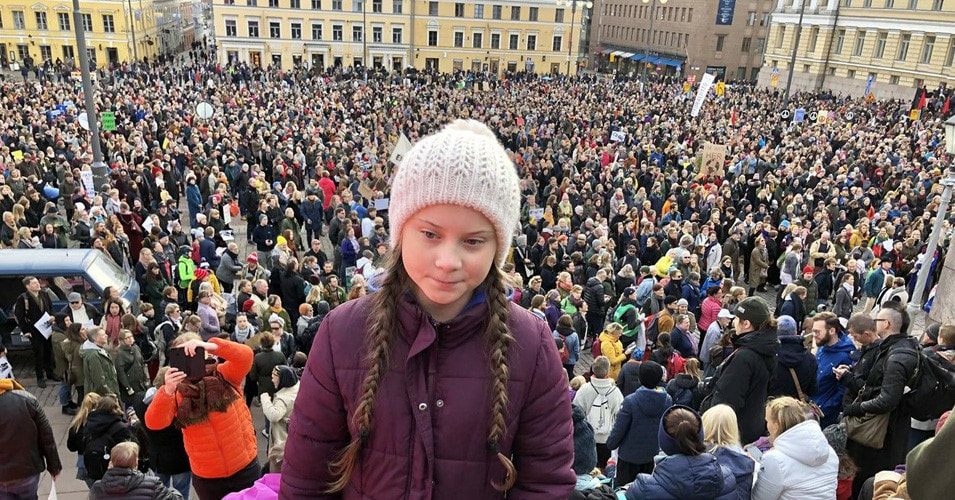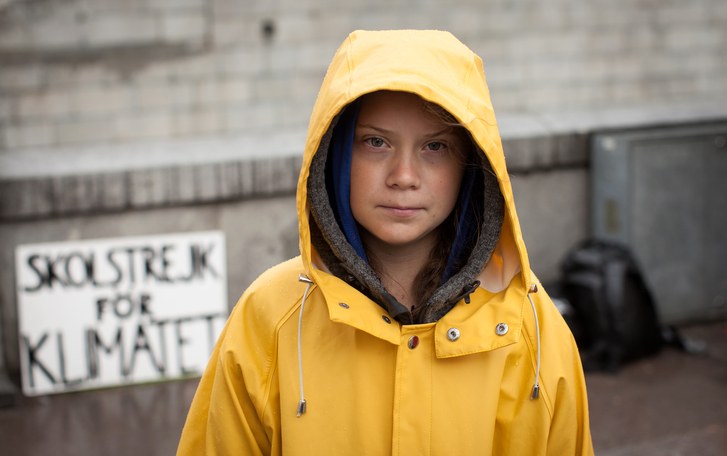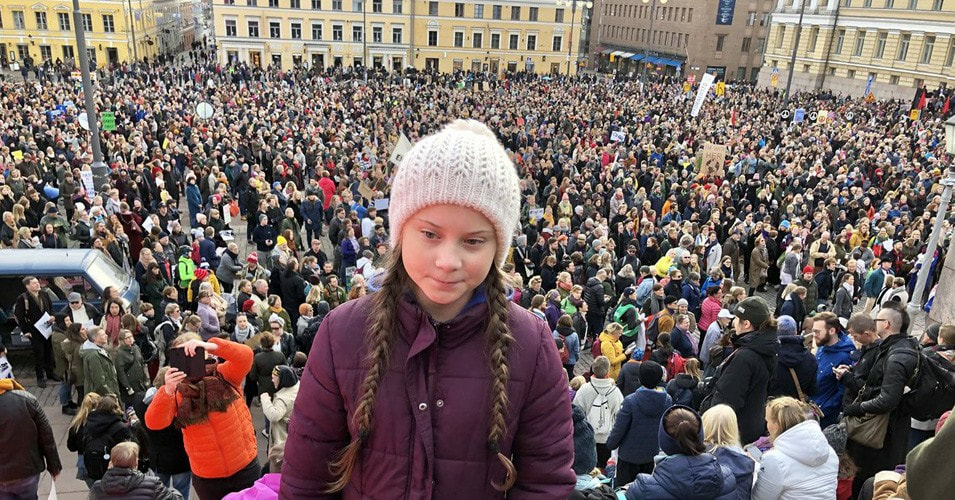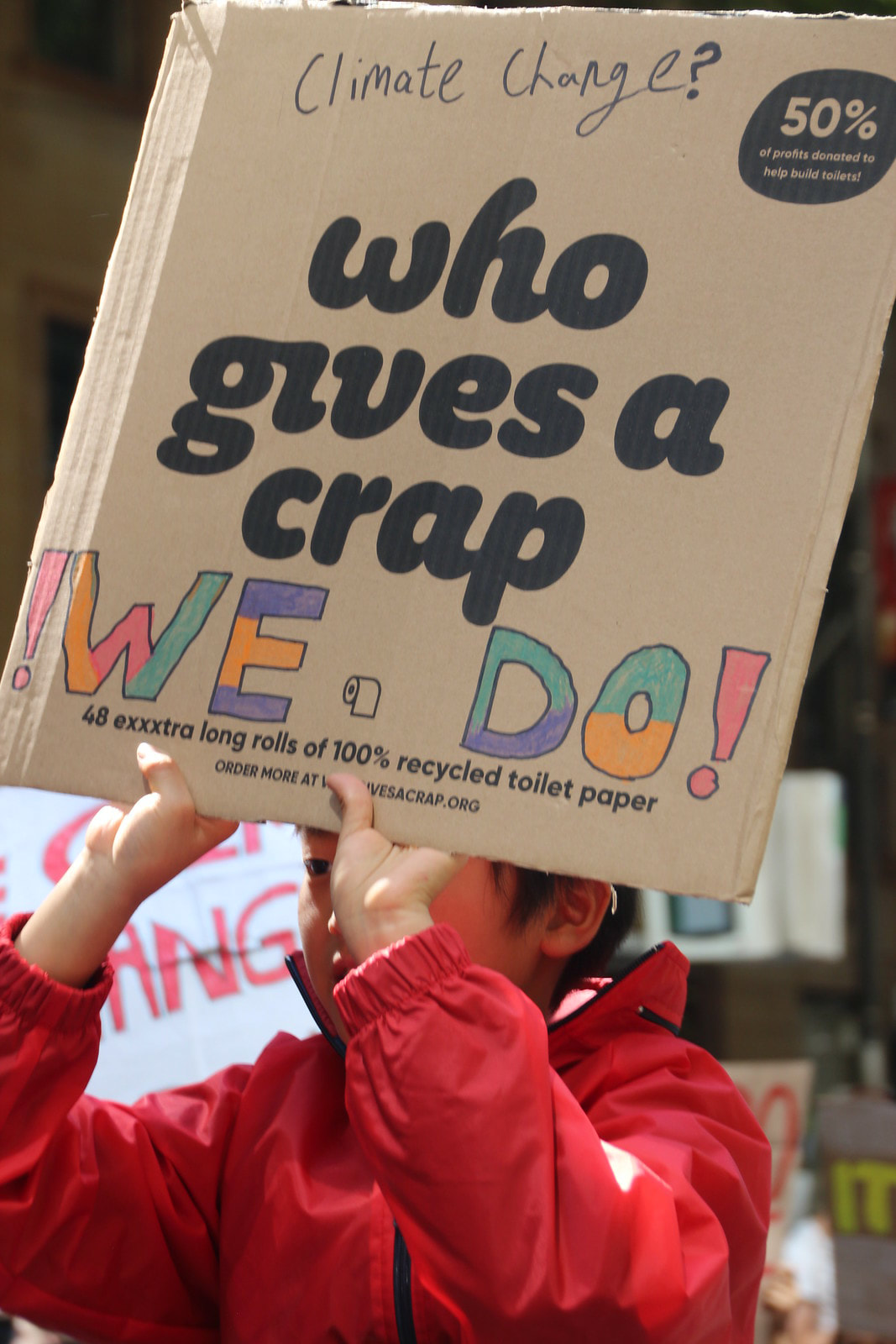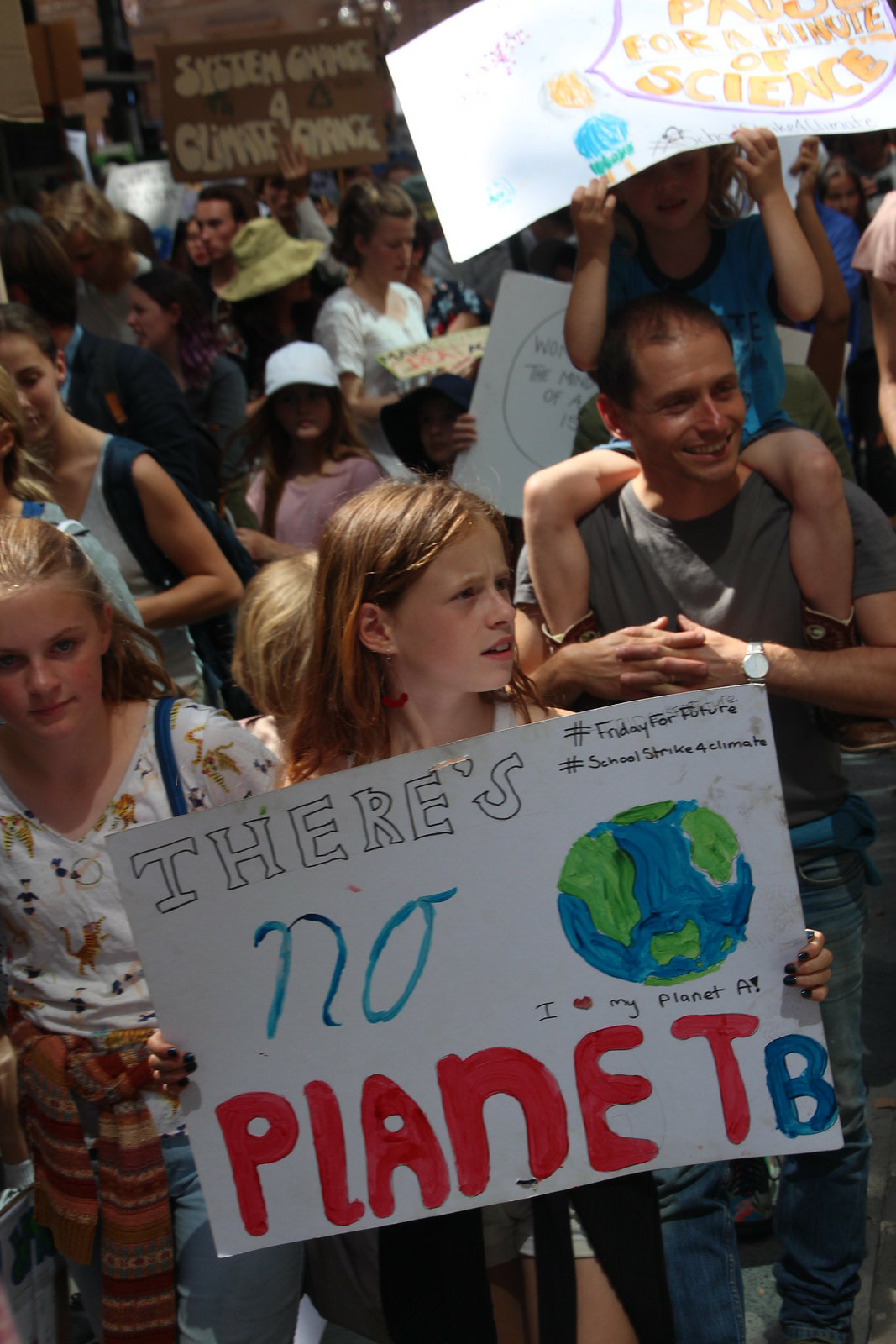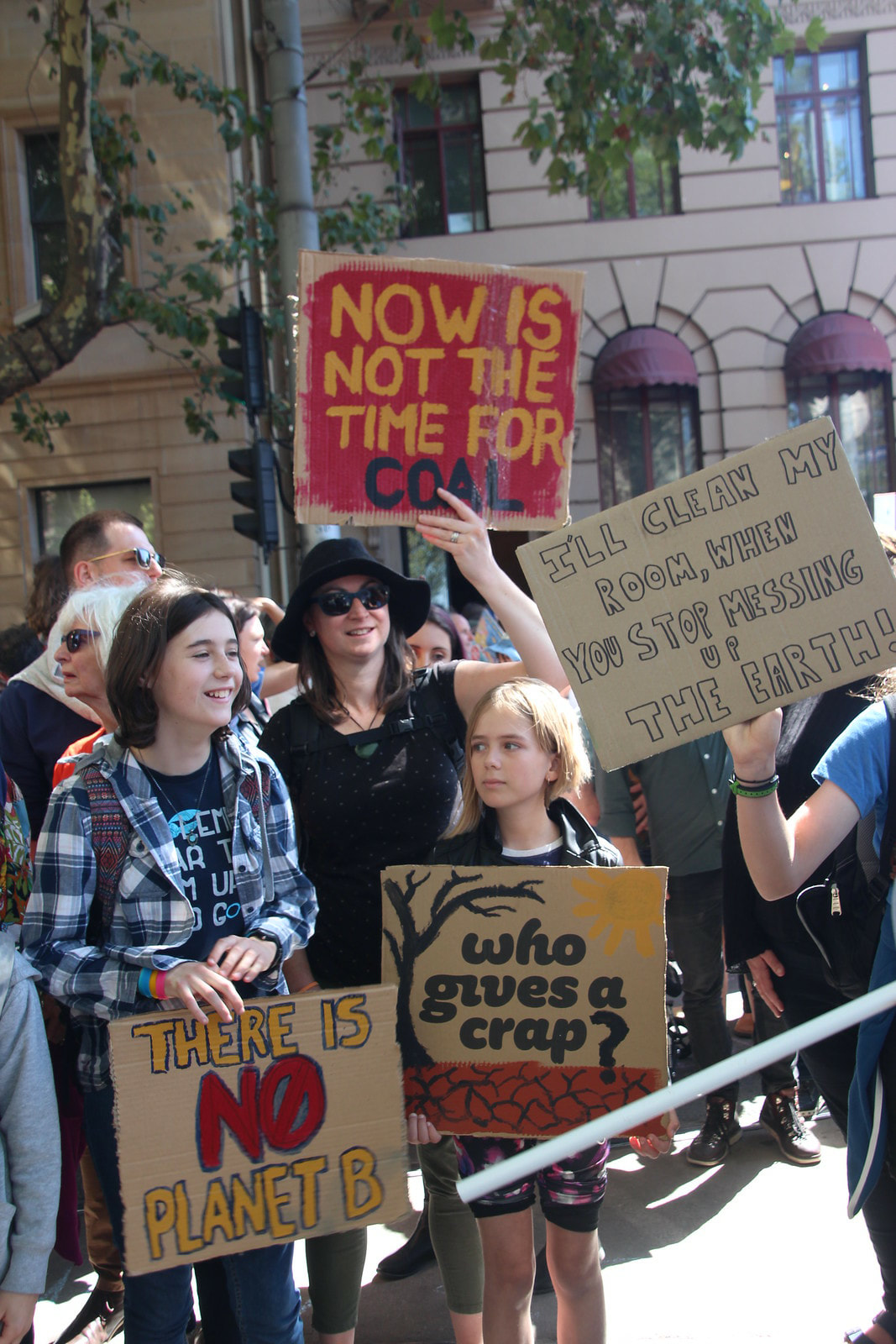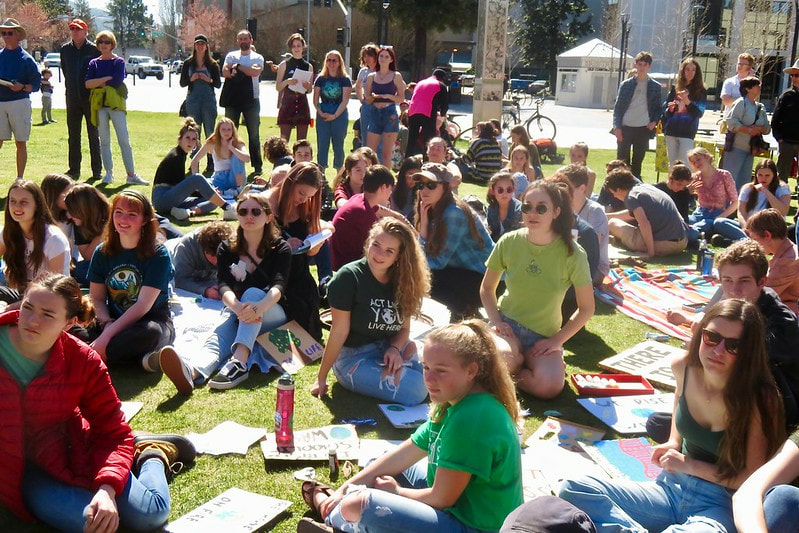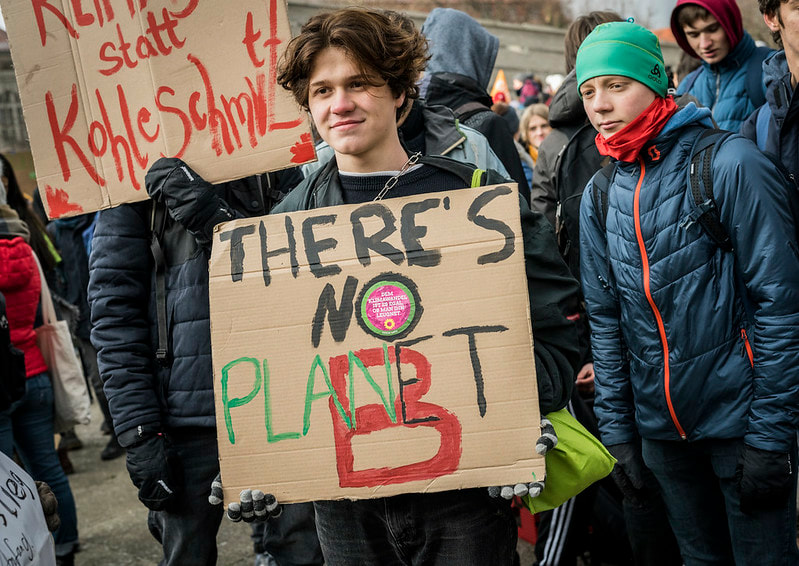Who Gives a Crap? We do.
Hello, My Name is Greta
|
|
|
Greta Thunberg as cited by Clifford Cobb, political economist
I want to close with a portion of the statement by Greta Thunberg, a 15-year-old Swedish girl who had the courage tell my generation that nothing is more important to her generation than that we begin to make the needed changes of pretending that nothing is wrong. Here are her words at the 24th meeting of the United Nations climate conference, group that is supposed to be finding solutions and is failing to do so:
"Until you start focusing on what needs to be done rather than what is politically possible, there is no hope. We can’t solve a crisis without treating it as a crisis. We need to keep the fossil fuels in the ground, and we need to focus on equity. And if solutions within the system are so impossible to find, maybe we should change the system itself."
In another talk, she told about herself:
"When I was about eight years old, I first heard about something called climate change. … I remember thinking that it was very strange that humans … could be capable of changing the Earth's climate. Because if we were … we wouldn't be talking about anything else. As soon as you'd turn on the TV, everything would be about that … as if there was a world war going on. But no one ever talked about it. … To me, that did not add up. It was too unreal. So when I was 11, I became ill. I fell into depression, I stopped talking, and I stopped eating. In two months, I lost about 10 kilos of weight."
Without words, her body told a story that was even more profound than her words. It was a story of a world out of control, where language failed, where people were starving. She was imitating the collapse of the world around her. She took the insanity of the adult world and made it her own. In so doing, she began a transformation of herself and those around her. She started a school strike, saying, “Why should I be studying for a future that soon will be no more?” Hope does not lie so much in the specific words she speaks but in the mere fact that she speaks them.
Perhaps she will arouse some adults to action, but even more important, she may inspire other children of the world to refuse to accept inaction from world leaders. I hope her peers can undergo the sort of personal transformation of deep depression followed by activism that has given her the courage to speak up. That is where a new story is likely to come from--the testimonials of the youth whose lives we are cutting short. If we hear their stories, will we be prepared to listen and to act?
-- from "Aligning Private Interest with Public Purpose," delivered at 13th annual forum on Ecological Civilization sponsored by the Institute for Postmodern China, held in Claremont, California, April 19-20, 2019.
"Until you start focusing on what needs to be done rather than what is politically possible, there is no hope. We can’t solve a crisis without treating it as a crisis. We need to keep the fossil fuels in the ground, and we need to focus on equity. And if solutions within the system are so impossible to find, maybe we should change the system itself."
In another talk, she told about herself:
"When I was about eight years old, I first heard about something called climate change. … I remember thinking that it was very strange that humans … could be capable of changing the Earth's climate. Because if we were … we wouldn't be talking about anything else. As soon as you'd turn on the TV, everything would be about that … as if there was a world war going on. But no one ever talked about it. … To me, that did not add up. It was too unreal. So when I was 11, I became ill. I fell into depression, I stopped talking, and I stopped eating. In two months, I lost about 10 kilos of weight."
Without words, her body told a story that was even more profound than her words. It was a story of a world out of control, where language failed, where people were starving. She was imitating the collapse of the world around her. She took the insanity of the adult world and made it her own. In so doing, she began a transformation of herself and those around her. She started a school strike, saying, “Why should I be studying for a future that soon will be no more?” Hope does not lie so much in the specific words she speaks but in the mere fact that she speaks them.
Perhaps she will arouse some adults to action, but even more important, she may inspire other children of the world to refuse to accept inaction from world leaders. I hope her peers can undergo the sort of personal transformation of deep depression followed by activism that has given her the courage to speak up. That is where a new story is likely to come from--the testimonials of the youth whose lives we are cutting short. If we hear their stories, will we be prepared to listen and to act?
-- from "Aligning Private Interest with Public Purpose," delivered at 13th annual forum on Ecological Civilization sponsored by the Institute for Postmodern China, held in Claremont, California, April 19-20, 2019.
Once Again,What's the Problem?
Learning from David Ray Griffin's Unprecedented: Can Civilization Survive the CO2 Crisis?
Global climate change is not the only problem we face today. Our problems include war, obscene economic inequity, ethnic nationalisms, environmental degradation, rampant consumerism, domestic violence, religious fundamentalisms, and (in the United States) political breakdown. And they include global climate change, which may well offer fuel for the other fires, and foist various forms of tragedy on many other creatures as well.
The problem is easy to understand. The future has arrived and it looks like this: heat waves, droughts and wildfires, more extreme storms, rising sea levels, fresh water shortages, food shortages, climate refugees, climate wars, collapsing ecosystems, and extinctions. Among humans, those who suffer the most will be the next generation but, in truth, the suffering has already begun.
Perhaps if we center our lives around the values of consumerism -- appearance, affluence, and marketable achievement -- we can hide from it, pretending that our personal journeys and the well-being of our loved ones are all that really matter. We can think selfishly and act selfishly. The climate-change deniers and fossil-fuel industry will help us in our hiding. So will the preachers who tell us that the future is in God's hands alone, and that there's really nothing to worry about. The relative silence of the media and educational institutions will also help us.
But if we suffer the effects of the food and water shortages, if we cannot find shelter from the storms, this hiding is not an option. The future of climate change is our immediate environment. And if we live in relative comfort but want to live with a sense of integrity, loyal to the world and committed to the well-being of life, the hiding is also not an option. We know that the measure of our lives is not how much money me make or comfort we enjoy, but rather how much love we give. We know that we are small but included in a larger web of life and that each node in the web is precious. If we believe in God, we know that the future is open even for God, and that God beckons us to respond to the new normal with wisdom and compassion, responsive to the suffering and grateful for the beauty of life. Even if we can find shelter from the storms, we want others to have that shelter, too. Even if we do enjoy clean water, we want others to have water, too. We cannot separate our happiness from that of others. We feel part of a larger community and we call it the earth. Our motto is: Think Planetarily, Act Locally.
We can demand that our public leaders take heed of the new situation, developing wise public policies. We can urge our schools and universities to provide us with skills and wisdom for responding to the new normal. We can work in our own local settings to build transition communities: that is, local communities that are resilient to the vicissitudes of changing weather. These are communities that are creative, compassionate, participatory, multiicultural, and ecologically wise -- with no one left behind. We can become part of the transition town movement. Along the way we may find that our personal skills -- accounting, gardening, business management, merrymaking -- are indeed very useful. And we will realize that the very development of transition towns can be, as it were, fun. For more on this, see Sustainable Community: Making the Transition.
In this sense, and this sense alone, the climate crisis is also a climate opportunity. It is an opportunity for widened horizons, freedom from consumerism, and the enjoyment of what we in the process world call "strength of beauty" in community with others. But any talk of this opportunity best begins with reliable information and a good overview. It helps if there is a single book that can function as a climate change manual -- a bible for climate change respondents and transition town builders. It needs to explain what climate change is, where we have failed, where the challenges lie, and what can be done to help save human civilization. David Ray Griffin's Unprecedented, described below, can be that book.
-- Jay McDaniel
The problem is easy to understand. The future has arrived and it looks like this: heat waves, droughts and wildfires, more extreme storms, rising sea levels, fresh water shortages, food shortages, climate refugees, climate wars, collapsing ecosystems, and extinctions. Among humans, those who suffer the most will be the next generation but, in truth, the suffering has already begun.
Perhaps if we center our lives around the values of consumerism -- appearance, affluence, and marketable achievement -- we can hide from it, pretending that our personal journeys and the well-being of our loved ones are all that really matter. We can think selfishly and act selfishly. The climate-change deniers and fossil-fuel industry will help us in our hiding. So will the preachers who tell us that the future is in God's hands alone, and that there's really nothing to worry about. The relative silence of the media and educational institutions will also help us.
But if we suffer the effects of the food and water shortages, if we cannot find shelter from the storms, this hiding is not an option. The future of climate change is our immediate environment. And if we live in relative comfort but want to live with a sense of integrity, loyal to the world and committed to the well-being of life, the hiding is also not an option. We know that the measure of our lives is not how much money me make or comfort we enjoy, but rather how much love we give. We know that we are small but included in a larger web of life and that each node in the web is precious. If we believe in God, we know that the future is open even for God, and that God beckons us to respond to the new normal with wisdom and compassion, responsive to the suffering and grateful for the beauty of life. Even if we can find shelter from the storms, we want others to have that shelter, too. Even if we do enjoy clean water, we want others to have water, too. We cannot separate our happiness from that of others. We feel part of a larger community and we call it the earth. Our motto is: Think Planetarily, Act Locally.
We can demand that our public leaders take heed of the new situation, developing wise public policies. We can urge our schools and universities to provide us with skills and wisdom for responding to the new normal. We can work in our own local settings to build transition communities: that is, local communities that are resilient to the vicissitudes of changing weather. These are communities that are creative, compassionate, participatory, multiicultural, and ecologically wise -- with no one left behind. We can become part of the transition town movement. Along the way we may find that our personal skills -- accounting, gardening, business management, merrymaking -- are indeed very useful. And we will realize that the very development of transition towns can be, as it were, fun. For more on this, see Sustainable Community: Making the Transition.
In this sense, and this sense alone, the climate crisis is also a climate opportunity. It is an opportunity for widened horizons, freedom from consumerism, and the enjoyment of what we in the process world call "strength of beauty" in community with others. But any talk of this opportunity best begins with reliable information and a good overview. It helps if there is a single book that can function as a climate change manual -- a bible for climate change respondents and transition town builders. It needs to explain what climate change is, where we have failed, where the challenges lie, and what can be done to help save human civilization. David Ray Griffin's Unprecedented, described below, can be that book.
-- Jay McDaniel
|
ANNOTATED TABLE OF CONTENTS OF DAVID RAY GRIFFIN'S UNPRECEDENTED
offered by publisher, Clarity Press PART I: UNPRECEDENTED THREATS
Introduction: The basic issue is whether global warming, besides leading to a hellish existence for our children and grandchildren, will destroy civilization. Each chapter in Part I addresses 3 possible responses: Plan B (mobilization), Plan A (business as usual), and Plan C (wait and see). 1 Extreme Weather: Prior to discussing four types of “extreme weather,” this chapter discusses extreme weather in general and how global warming is responsible for it. 2 Heat Waves: This chapter deals with the phenomenon that comes to mind most readily when people think of “global warming,” namely, warmer weather, which will include hotter and more frequent heat waves. The danger is that the temperature will make life hellish, eventually intolerable. 3 Droughts and Wildfires: Drought has thus far been the climate effect most harmful to people. Aggravated by global warming, its pernicious effects include dramatic increases in wildfires. 4 Storms: Various types of storms are becoming more extreme and increasing in number: rainstorms (deluges), which increase flooding; major snowstorms – as in the "Snowpocalypse" of 2009; hurricanes, which are becoming bigger and stronger (such as Katrina and Sandy); and tornadoes, which have been shown by recent evidence to be also intensified by global warming. 5 Sea-Level Rise: This chapter deals with scientific projections about sea-level rise if business as usual continues (perhaps 7 feet by end of century) and what this will do to island nations and the coastal areas of the USA, China, and many other countries. 6 Fresh Water Shortage: Although national security experts have long worried about peak oil, “the real threat to our future,” said Lester Brown, “is peak water.” There are substitutes for oil, but there is no substitute for fresh water, which is getting less plentiful in many parts of the world, due to melting glaciers, shrinking snowpack, decreasing water in lakes and rivers, and the depletion of aquifers. 7 Food Shortage: According to Oxfam, “Increased hunger is likely to be one of climate change’s most savage impacts.” Food shortage will be increased by extreme weather, water shortage; and global warming’s “equally evil twin” - ocean acidification - which, if it continues, will lead to a world without seafood. 8 Climate Refugees: Climate refugees have to leave home because of some type of climate-influenced change, such as sea-level rise, upon which this chapter focuses. If climate change continues, the refugees will number in the millions and eventually billions. Going with anything other than Plan B will be catastrophic. 9 Climate Wars: Climate disruption is also important because of ways it could threaten national security and the world’s political-economic order, due primarily to increasing resource scarcity. Conflict over scarcity may end up influencing more people than any of the other results of climate change. Plan B is the only way to minimize international strife. 10 Ecosystem Collapse and Extinction: Although any one of the changes in Chs. 1-9 could become catastrophic, even worse will be the occurrence of some of these changes simultaneously, which could lead to global ecosystem collapse. With business as usual, the sixth mass extinction, which we are already in, will eventually include us. PART II: UNPRECEDENTED CHALLENGES AND FAILURES 11 Climate Change Denial: Worst in America, climate-change denialism has resulted from a concentrated campaign by the fossil-fuel industry to repudiate the scientific consensus and promote public uncertainty. This chapter examines techniques previously used by big business to impact public opinion in relation to smoking, acid rain, CFCs, and the ozone layer, showing how they are now being used by the fossil-fuel industry to dispute the conclusion of virtually all climate scientists that fossil fuels – coal, oil, and natural gas - are imperiling our planet. The fossil-fuel industry, which knows its claims to be false, has deceived many citizens into accepting its propaganda over the evidence provided by climate scientists. This chapter debunks a large number of the claims against climate science, 12 Media Failure: The fossil-fuel industry’s denialist strategy has been forced upon, if not willingly embraced by, the major American corporate media, leading to their failure to adequately address either the science or the urgency of climate disruption. Examined here are various media techniques geared to produce public uncertainty on the issue: reduced coverage, inadequate contextualization of extreme weather events, and false balance (giving the opinions of propagandists paid by Big Oil as much attention as the views of renowned climate scientists), and going even beyond that to explicit denialism. 13 Political Failure: This chapter documents the historical record of global failures to successfully address climate change and explains reasons why. It demonstrates the extent to which politicians have overruled the findings of science and analyzes their motives. The record of US Presidents on climate change is examined. Charting the Republican stampede toward absolute climate change denial since 2011, it names specific malefactors pursuing their selfish private interests to shed light on what British journalist George Monbiot terms “the greatest political failure the world has ever seen.” 14 Moral Challenge: There is a basic global ethic related to global warming implicit in our understanding of human rights as well as religious principles. The primary issue is intergenerational justice - whether today’s generation will finally act fast and decisively enough to save a tolerable planet for our descendants or continue to act within the boundaries of its narrowly defined self-interest. The notion of moral obligation in relation to climate protection, along with the capacity of morality to make a difference, is re-enforced by parallels to successful global justice campaigns: the abolition of slavery and divestment from South African apartheid. 15 Religious Challenge: American religious culture has mainly revolved around theism, which comes in both traditional and non-traditional forms. Traditional theism, which holds that the supreme being is omnipotent, is held by most Evangelical Christianity. This view often results in climate complacency, holding that the world will not be destroyed by global warming unless God wants this to happen - an attitude expressed by several members of the U.S. Congress. Some Evangelical Christians resist this tendency, instead fighting strongly to stop global warming. But there are forms of theism that more fully support climate concern. 16 Economic Challenge: Besides being impeded by limited moralities and false religious ideas, society’s task of saving civilization has also been impeded by false economic ideas. Starting with the complacency of Yale’s William Nordhaus, this chapter traces the mounting urgency of coming to grips with the projected costs of climate disruption through the thinking of Oxford’s Nicholas Stern and Harvard’s Martin Weitzman – who warns that the costs could be infinite. Whereas Nordhaus argued that going full out to reduce carbon emissions as quickly as possible would damage the economy, a growing number of economists have realized, with Stern and Weitzman, that going full out is the only way to save the economy. This chapter ends with the policies most needed: a carbon tax and the elimination of fossil-fuel subsidies. PART III: WHAT IS TO BE DONE 17 Transitioning to Clean Energy: Fossil-fuel industry propaganda has claimed that clean energy is too expensive and could not, in any case, power civilization. But developments over the past decade show that clean and renewable energy is now not only achievable but also affordable. This chapter discusses various types of clean energy, including solar, wind, geothermal, and ocean energy, showing how these, combined with hydropower, could provide far more than enough energy to power civilization. Also discussed are automobiles, trains, and airplane fuels that could make 100% clean transportation possible. The great untold story is that the planet’s energy could be 70% clean by 2035 and 100% clean by 2050. 18 Abandoning Dirty Energy: The “carbon budget” - meaning the most additional carbon that could be burned without catastrophe - shows that, if there is to be any hope, fossil fuels must be quickly phased out. Coal and oil have long been the primary threats to the planet. But natural gas, alleged to be a “bridge” to clean energy, has become equally harmful, especially with the rise of “fracking.” And oil is now more dangerous than ever due to the exploitation of “tough oil.” Fossil fuel companies have been irresponsible global citizens and a primary threat to civilization. Now that there are numerous alternatives, we should have no regrets about swiftly phasing them out of business. 19 Mobilization: Lester Brown, author of Plan B: Mobilizing to Save Civilization, says that quickly moving from fossil fuels to clean energy “will take a massive mobilization - at wartime speed.” Any global mobilization would likely need to begin in the United States: The President should declare a national climate emergency and implement pro-climate policies on an appropriate scale. Such US leadership should then enable, indeed unleash, a similar mobilization worldwide. This mobilization will require leadership of many different levels and types, mounting from all sectors of society (academic, activist, agricultural, business, entertainment, labor, media, political, scientific, and so on) to enable such presidential action. Conclusion: We are facing an unprecedented challenge. This chapter drives home the need to devote ourselves to the task wholeheartedly for the coming decades, until the transition to a clean-energy economy has been made. |
See David Griffin's special for CNN: click here
David Ray Griffin is Professor of Philosophy of Religion and Theology, Emeritus, Claremont School of Theology and Claremont Graduate University (1973-2004); Co-Director, Center for Process Studies. He edited the SUNY Series in Constructive Postmodern Thought (1987-2004), which published 31 volumes. He has written 30 books, edited 13 books, and authored 250 articles and chapters.
Climate Change and Mental Health"...climate change has been identified as the biggest global health threat of the 21st Century. Recently, research is beginning to indicate that changes in climate, and the subsequent disruption to the social, economic, and environmental determinants of health, may cause increased incidences and prevalence of mental health issues, emotional responses, and large-scale sociopsychological changes... Participants reported that changes in climate and environment increased family stress, enhanced the possibility of increased drug and alcohol usage, amplified previous traumas and mental health stressors, and were implicated in increased potential for suicide ideation. While a preliminary case study, these exploratory findings indicate that climate change is becoming an additional mental health stressor for resource-dependent communities and provide a baseline for further research."
-- Climate change and mental health: an exploratory case study from Rigolet, Nunatsiavut, Canada |
